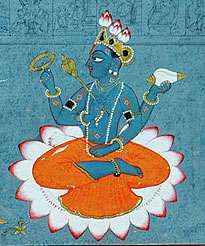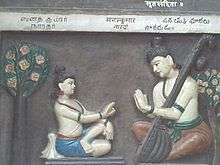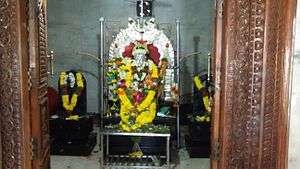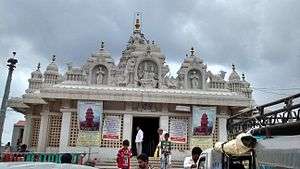Narada
| Narada | |
|---|---|
 Sage Narada | |
| Devanagari | नारद |
| Affiliation | Devotee of Vishnu |
| Symbols | Khartal, Veena |
| Texts | Narada Purana |
| Parents |
Brahma (father) Saraswati (mother) |
Narada (Sanskrit: नारद, Nārada) is a Vedic sage, famous in Hindu traditions as a traveling musician and storyteller, who carries news and enlightening wisdom.[1][2] He appears in a number of Hindu texts, notably the Mahabharata and the Ramayana, as well as in the mythologies of the Puranas.[2]
In Indian texts, Narada travels to distant worlds and realms (Sanskrit: lokas). He is depicted carrying a khartal and Veena with the name Mahathi and is generally regarded as one of the great masters of the ancient musical instrument. This instrument is known by the name "mahathi"[3][4] which he uses to accompany his singing of hymns, prayers and mantras. In the Vaishnavism tradition of Hinduism, he is presented as a sage with devotion to Lord Vishnu. Narada is described as both wise and mischievous, in humorous tales. Vaishnav enthusiasts depict him as a pure, elevated soul who glorifies Vishnu through his devotional songs, singing the names Hari and Narayana, and therein demonstrating bhakti yoga. The Narada Bhakti Sutra is attributed to him.
| Part of a series on |
| Vaishnavism |
|---|
 |
|
Sampradayas |
|
Philosophers–acharyas |
|
Related traditions |
|
|
Other texts named after Narada include Narada Purana and the Nāradasmṛti (pre 6th century CE text), the latter called the "juridical text par excellence" and represents the only Dharmaśāstra text which deals solely with juridical matters and ignoring those of righteous conduct and penance.[5]
The name Narada, referring to many different persons, appears in many mythical legends of Hinduism,[6] as an earlier birth of Sariputta in the Jataka tales of Buddhism as well as names of medieval Buddhist scholars,[7][8] and in Jainism.[9]
Mahabharata
In the Mahabharata, Narada was conversant with the Vedas and the Upanishads and was acquainted with history and Puranas. He had mastery of the six Angas: pronunciation, grammar, prosody, terms, religious rites and astronomy. All celestial beings worshiped him for his knowledge - he is supposed to be well versed in all that occurred in ancient Kalpas (time cycles) and is termed to be conversant with Nyaya (logic) and the truth of moral science. He was a perfect master in re-conciliatory texts and differentiating in applying general principles to particular cases. He could swiftly interpret contraries by references to differences in situation. He was eloquent, resolute, intelligent and possessor of powerful memory. He knew the science of morals, politics, skilled in drawing inference from evidence, and very proficient in distinguishing inferior things from superior ones. He was competent in judging the correctness and incorrectness of complex syllogistic statements consisting of 5 proponents. He was capable of arriving at definite conclusions about religion, wealth, pleasure and salvation. He possessed knowledge of this whole universe, above it, below it and everything surrounding it. He was capable of answering successively at Vrihaspati himself, while arguing. He was the master of the Sankhya and Yoga systems of philosophy, conversant with sciences of war and treaty and proficient in drawing conclusions of judging things not within a direct knowledge. He knew about the six sciences of treaty, war, military campaigns, maintenance of posts against the enemy and strategies of ambushes and reserves. He was a thorough master of every branch of learning. He was fond of war and music and was incapable of being repulsed by any science or any course of action.[10]
Puranas


The Bhagavata Purana describes the story of Narada's spiritual enlightenment: He was the primary source of information among Gods, and is believed to be the first journalist on Earth. He claimed to have 60 wives. In his previous birth Narada was a Gandharva (angelic being) who had been cursed to be born on an earthly planet as a sudra for singing glories to the demigods instead of the Supreme Lord.[11] He was born as the son of a maid-servant of some particularly saintly priests (Brahmins). The priests, being pleased with both his and his mother's service, blessed him by allowing him to eat some of their food (prasad), previously offered to their lord, Vishnu.
Gradually he received further blessings from these sages and heard them discussing many spiritual topics. After his mother died, he decided to roam the forest in search of enlightenment in understanding the 'Supreme Absolute Truth'.
Reaching a tranquil forest location, after quenching his thirst from a nearby stream, he sat under a tree in meditation (yoga), concentrating on the paramatma form of Vishnu within his heart as he had been taught by the priests he had served. After some time Narada experienced a vision wherein Narayan (Vishnu) appeared before him, smiling, and spoke "that despite having the blessing of seeing him at that very moment, Narada would not be able to see his (Vishnu's) divine form again until he died". Narayan further explained that the reason he had been given a chance to see his form was because his beauty and love would be a source of inspiration and would fuel his dormant desire to be with the lord again. After instructing Narada in this manner, Vishnu then disappeared from his sight. The boy awoke from his meditation both thrilled and disappointed.
For the rest of his life Narada focused on his devotion, meditation upon and worship to Vishnu. After his death Vishnu then blessed him with the spiritual form of "Narada" as he eventually became known. In many Hindu scriptures Narada is considered a saktyavesa-avatara or partial-manifestation (avatar) of God, empowered to perform miraculous tasks on Vishnu's behalf.
The Shiva Purana describes a unique story involving Narada. Once Narada decided to perform penance in a serene himalayan cave. An insecure Indra sent Kama (god of love) to disturb Narada's penance. But due to Shiva's presence in himalayas, Kama's acts were fruitless. Narada under the influence of Shiva's illusion, thinking his penance to be complete and proud of winning over Kama, goes to Shiva and Brahma to brag about his achievement. Both of them warn him not to mention this to Hari (Vishnu). But Narada swelling with pride, boasts of his victory over Kama befor Hari. Hari through his illusive powers creates a beautiful city in Narada's path with a king named Shilanidhi ruling it. An enchanted Narada, enters Shilanidhi's palace and learns about the swayamvara (choosing a husband) ceremony of his beautiful daughter named Shrimathi. Narada blesses her and takes leave but his mind still lingers around the beauty of Shrimathi.
He heads to Vaikunta (Vishnu's abode) and requests Hari to grant him his own form (Hari's form) so that he can obtain Shrimathi as his wife. Hari obliges and Narada obtains a body similar to that of Hari but his face would be that of a monkey, for the word 'Hari' can also mean monkey. Unaware of his monkey face, Narada attends Shrimathi's swayamvara. Shrimathi looks at Narada's form and gets disgusted and unable to choose a suitable husband among the assembled princes, waits at the centre of the assembly hall. Vishnu appears there in the form of a king and Shrimathi chooses him and vanishes along with him. Narada over hears Shivas attendants speaking of his monkey face. Narada looks at the mirror and angrily curses the two attendents to be born as demons in the family of a Brahmin.
Narada leaves the city and sees his reflection in a stream and realizes that his face has returned to normal. thinking this to be Hari's trick, he goes to Vaikunta and censures Hari in choicest of abuses and curses him "since you humiliated me for the sake of a woman, you shall assume human form and suffer separation from a woman, and monkeys shall be your allies". Then on being freed of the illusion Narada realizes his mistake and begs forgiveness. Hari assures him that it's no fault of his and advises him to worship Shiva in Kashi and learn about Shiva's greatness from Brahma. Narada temples are few, most prominent being, Sri Narada Muni Temple at Chigateri, Karnataka.[12]
Jainism
In Jainism, there are a total of 9 Naradas in every cycle of Jain Cosmology,[13] current cycle's Naradas were Bhima, Mahabhima, Rudra, Maharudra, Kala, Mahakala, Durmukha, Narakamukha and Adhomukha.


See also
References
Citations
- ↑ Christian Lee Novetzke (2003), Divining an Author: The Idea of Authorship in an Indian Religious Tradition, History of Religions, Vol. 42, No. 3, page 222
- 1 2 James G. Lochtefeld (2002). The Illustrated Encyclopedia of Hinduism: N-Z. The Rosen Publishing Group. p. 461. ISBN 978-0-8239-3180-4.
- ↑ Guy, Randor (31 July 2010). "Bhaktha Naradar 1942". The Hindu. Retrieved 9 October 2011.
- ↑ Bhag-P 1.5.1 Narada is addressed as 'Vina-panih', meaning "one who carries a vina in his hand"
- ↑ Lariviere 1989: ix
- ↑ Devdutt Pattanaik (2000). The Goddess in India: The Five Faces of the Eternal Feminine. Inner Traditions. p. 80. ISBN 978-0-89281-807-5.
- ↑ Sarah Shaw (2006). THE JATAKAS: Birth Stories of Bodhisatta. Penguin Books. p. 497. ISBN 978-81-8475-034-8.
- ↑ Martin Ramstedt (2005). Hinduism in Modern Indonesia. Routledge. p. 50. ISBN 978-1-135-79052-3.
- ↑ Helmuth von Glasenapp (1999). Jainism: An Indian Religion of Salvation. Motilal Banarsidass. pp. 273 with footnotes. ISBN 978-81-208-1376-2.
- ↑ The Mahabharata of Krishna Dwaipayana Vyasa Volume 1 Books 1, 2 and 3, Section XII
- ↑ Srimad Bhagavatam 7.15.72
- ↑ Hindu Gods and Goddesses
- ↑ Doniger 1999, p. 550.
Sources
- Doniger, Wendy, ed. (1999), Encyclopedia of World Religions, Merriam-Webster, ISBN 0-87779-044-2
- Translation by Richard W. Lariviere (1989). The Nāradasmr̥ti. University of Philadelphia.
External links
| Wikimedia Commons has media related to Narada. |
- Narada's Instructions on Srimad-Bhagavatam for Vyasadeva
- References to Narada in Gaudiya Vaishnava texts
- Ruesi Narot - Narada in Buddhist Thailand
- Narada’s Aphorisms on Bhakti (Ed. Sarma, Y Subrahmanya)
- Nārada Bhakti Sūtras (Tr. Bhuteshananda, Swami)
- Nārada-Bhakti-Sūtra: The Secrets of Transcendental Love (Tr. Prabhupāda, A C Bhaktivedanta Swami et al.)